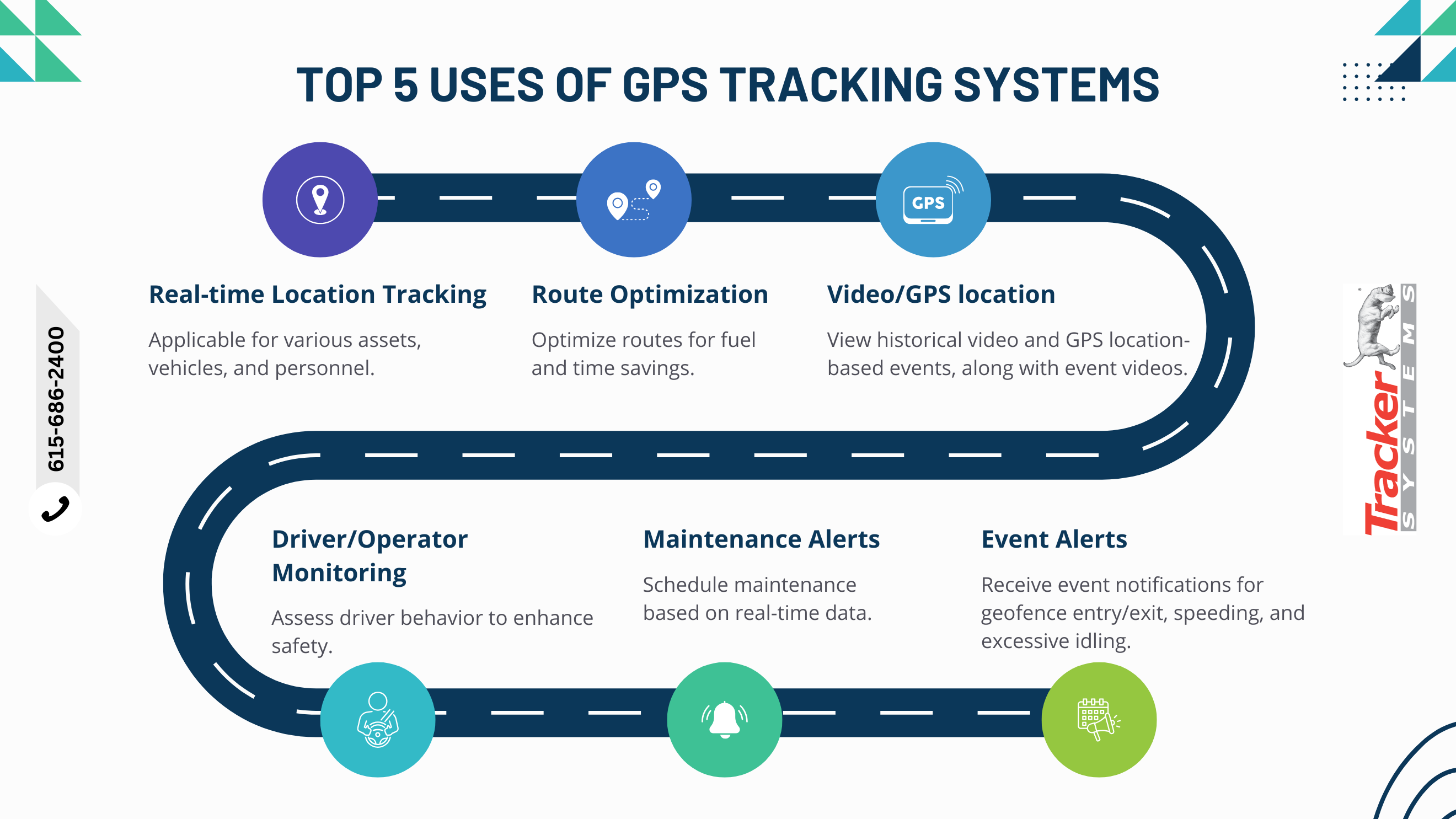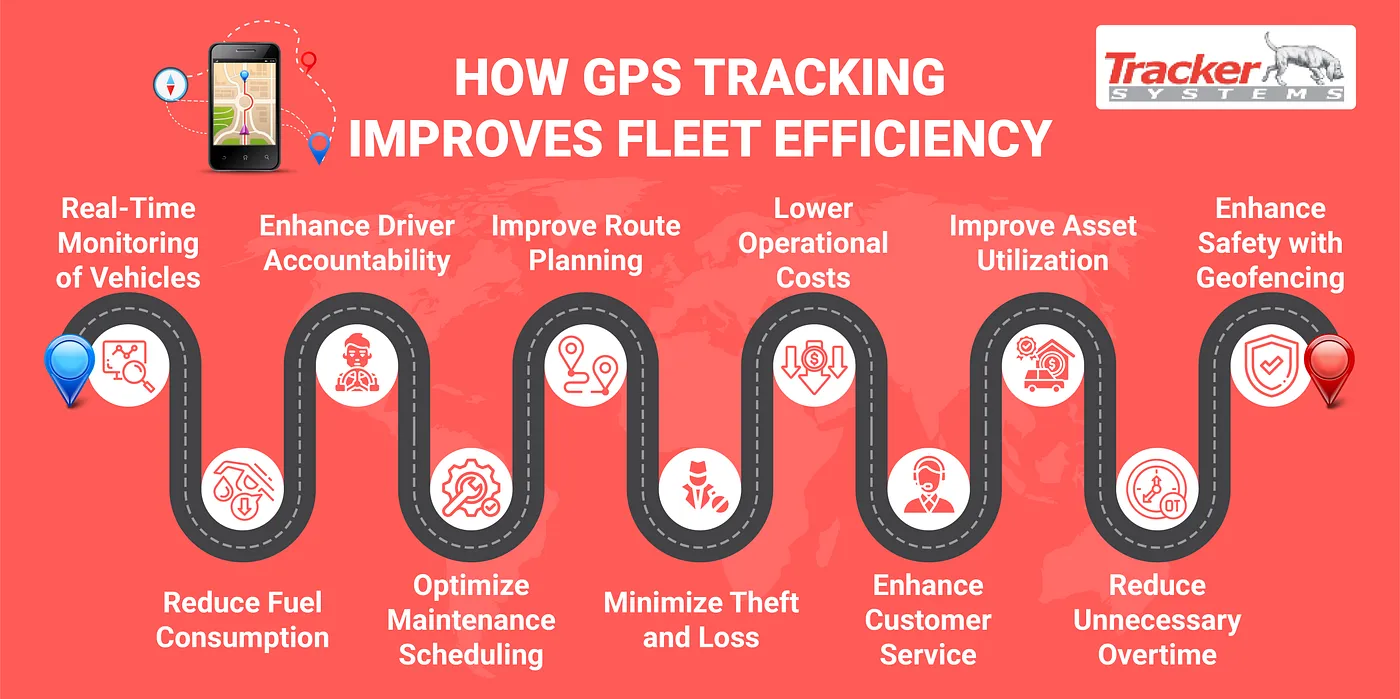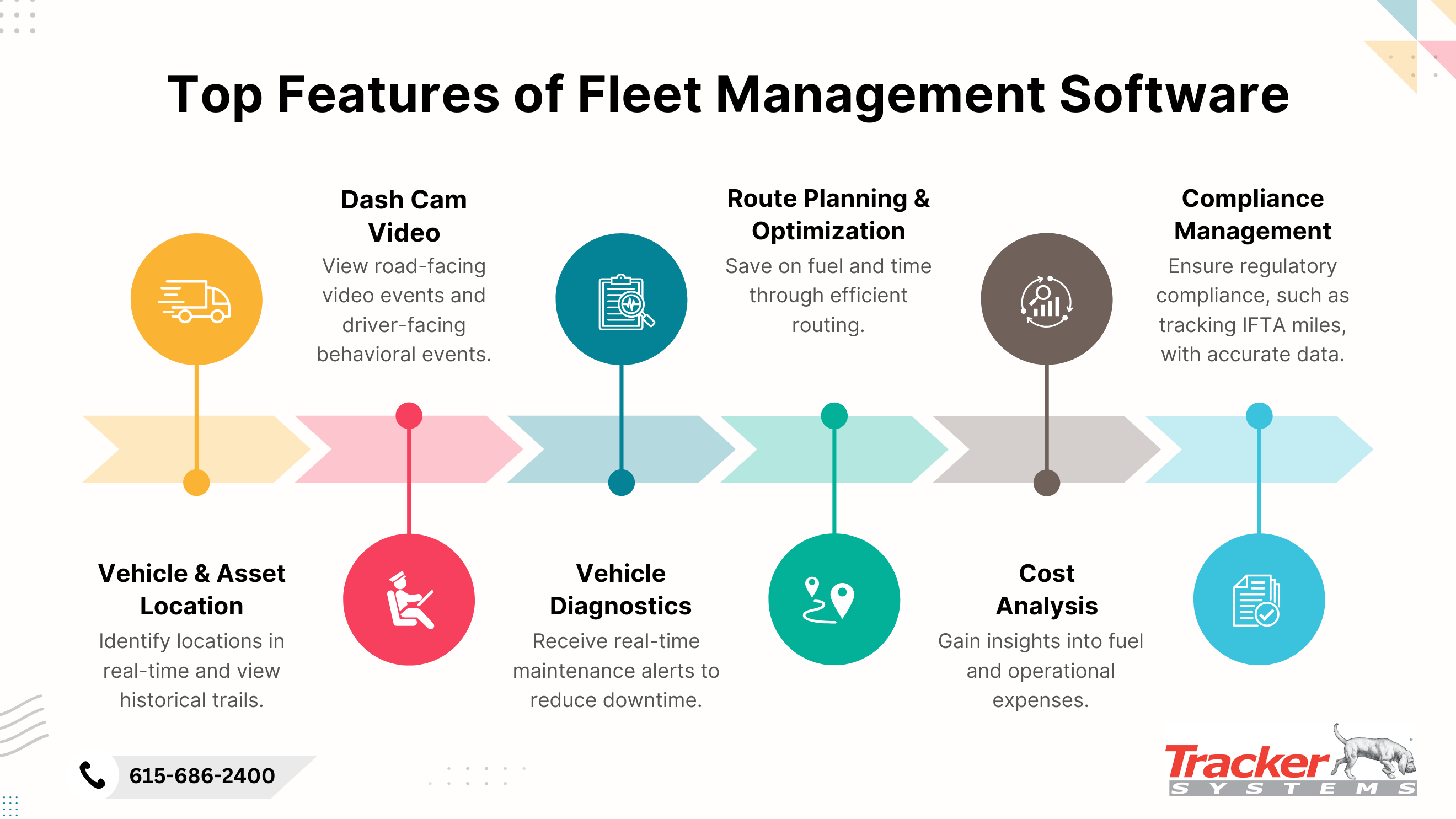What is a GPS Tracker System and How Does It Work?
Managing a fleet of vehicles comes with a host of challenges, from keeping track of vehicle locations and ensuring driver safety to minimizing fuel costs and improving operational efficiency. One common problem that fleet managers, logistics coordinators, and business owners often face is the lack of real-time visibility into their fleet’s movements. Without accurate and timely information, fleets can struggle with delays, inefficient routes, increased fuel consumption, and safety risks, all of which can significantly impact the bottom line.
This is where a GPS tracking system comes in. These advanced tools provide a comprehensive solution by offering real-time data on vehicle locations, driver behavior, and route optimization. By understanding how GPS tracking systems work, fleet managers can make data-driven decisions that streamline operations, reduce costs, and enhance safety. In this guide, we’ll explore what GPS tracker systems are, how they work, their key features, benefits, and practical use cases in fleet management.
What is a GPS Tracker System?
A GPS tracker system is a sophisticated technology that monitors and manages the location of vehicles, assets, or equipment in real time. For fleet management, GPS trackers play a critical role in improving efficiency, safety, and overall fleet performance. Let’s break down the key components that make up a GPS tracking system -
- Satellites - At the core of every GPS system is a network of satellites orbiting our planet. These satellites continuously transmit signals that contain information about their location as well as the exact time at which the signals are sent. There are currently around 31 active GPS satellites in orbit as part of the Global Positioning System.
- GPS Receivers - Each vehicle in the fleet is equipped with a GPS receiver, a small device that captures signals from multiple satellites. The receiver processes these signals to determine the vehicle’s location, speed, and direction in real time. Advanced GPS receivers can also capture additional data, such as engine diagnostics and driver behavior.
- Tracking Software - The data collected by the GPS receivers is then sent to a central server and displayed on tracking software. This software offers fleet managers a comprehensive dashboard showing real-time vehicle locations, route histories, driver behavior, and other critical insights. The software is often accessible through web-based platforms, mobile apps, or integrated fleet management systems.
By combining these components, GPS tracking systems provide a powerful tool that helps fleet managers monitor their operations with precision and ease. Whether it’s a small delivery service or a large logistics company, these systems are adaptable to the unique needs of any fleet.
How Does a GPS Tracker Work?
To fully appreciate the value of GPS tracking systems, it’s important to understand the technical workings behind them. Here’s a detailed look at how GPS trackers operate -
- Signal Reception - GPS tracking begins with the receiver installed in each vehicle. This device is constantly searching for signals from multiple satellites in orbit. To accurately determine a location, the receiver must connect with at least four satellites. Each satellite sends a signal that includes its exact location and the time the signal was transmitted.
- Trilateration - Once the receiver gathers signals from multiple satellites, it uses a mathematical process known as trilateration to calculate the vehicle’s exact position. Trilateration works by calculating the time it takes for each satellite’s signal to reach the receiver, allowing it to determine the distance between the vehicle and each satellite. By combining these distances, the system can pinpoint the vehicle’s location on the Earth's surface with high accuracy.
- Data Transmission - After the location is determined, the GPS receiver transmits this data to a central server via cellular or satellite networks. This transmission occurs in real time, allowing fleet managers to view live updates of their vehicles’ positions. The data is then processed and displayed on fleet management software, which can be gathered from any mobile device or computer with an internet connection.
This seamless process of receiving signals, calculating locations, and transmitting data allows fleet managers to maintain a real-time overview of their entire fleet, making it easier to optimize routes, enhance safety, and improve overall operational efficiency.

Key Features of GPS Fleet Tracking Systems
GPS fleet tracking systems come with a range of features that go beyond simple location tracking. These advanced functionalities are designed to address the specific needs of fleet managers, providing deeper insights and greater control over operations. Here’s a closer look at some of the key features -
- Real-time Location Tracking - One of the core functions of a GPS tracker is to provide real-time updates on vehicle locations. This feature is essential for dispatchers who need to monitor where their vehicles are at any given moment, allowing for better coordination and faster response times. Real-time tracking helps prevent unauthorized use, reduces idle time, and ensures that vehicles are following planned routes.
- Route Optimization Capabilities - Route optimization is a crucial aspect of fleet management. GPS tracking systems analyze traffic patterns, road conditions, and historical data to provide the most efficient routes. This not only saves time but also significantly reduces fuel consumption, leading to lower operational costs. It enables fleet managers to adjust routes on the fly in response to changing conditions, ensuring timely deliveries and improved customer satisfaction.
- Driver Behavior Monitoring - GPS trackers can also monitor and report on driver behavior, providing insights into speeding, harsh braking, rapid acceleration, and excessive idling. These data points help fleet managers identify risky driving habits and implement corrective measures through training and feedback. Improved driver behavior not only enhances safety but also reduces vehicle wear and tear, extending the lifespan of fleet assets.
- Maintenance Alerts and Diagnostics - Proactive maintenance is key to minimizing downtime and keeping vehicles in optimal condition. GPS tracking systems can integrate with vehicle diagnostics to provide alerts for scheduled maintenance, engine issues, or other mechanical problems. These alerts help prevent breakdowns by addressing potential issues before they become major problems, saving both time and money.
- Geofencing and Unauthorized Use Alerts - Geofencing enables fleet managers to create virtual boundaries around certain areas, like job sites, delivery zones, or restricted regions. If a truck or a vehicle enters or exits these zones, the system sends an alert, notifying managers of potential unauthorized use or deviations from the planned route. This feature is particularly valuable for preventing theft and ensuring that vehicles are being used appropriately.
These features provide fleet managers with the tools they need to enhance operational efficiency, enforce compliance, and maintain control over their assets.
Benefits of GPS Tracking in Fleet Management
The implementation of GPS tracking systems offers a multitude of benefits that directly impact the efficiency, safety, and profitability of fleet operations. Here’s how GPS tracking can transform fleet management -
- Cost Efficiency - One of the most significant advantages of GPS tracking is its ability to reduce operational costs. By optimizing routes, fleet managers can minimize fuel consumption and reduce the time vehicles spend on the road. In addition, monitoring driver behavior helps reduce instances of speeding and harsh braking, which can lead to lower fuel usage and decreased maintenance costs. Over time, these savings add up, making GPS tracking a valuable investment for any fleet.
- Enhanced Safety - GPS tracking systems play a crucial role in promoting safer driving practices. By monitoring driver behavior, such as speed, braking patterns, and idle times, fleet managers can identify areas to improve for the drivers and offer additional training or support. This proactive approach to safety reduces the risk of accidents, lowers insurance premiums, and fosters a culture of accountability and responsibility among drivers.
- Theft Recovery - Vehicle theft is a major concern for fleet operators, but GPS tracking systems provide a powerful tool for recovering stolen assets. In case of a stolen vehicle, the real-time tracking feature allows managers to locate the vehicle quickly and coordinate with law enforcement for a swift recovery. This not only saves valuable assets but also minimizes the impact of theft on business operations.
- Improved Customer Satisfaction - In today’s fast-paced business environment, customers expect timely and accurate service. GPS tracking enables fleets to provide precise ETAs, allowing for improved communication with customers and faster response times to service requests. By improving delivery accuracy and reducing delays, fleets can better their reputation and build stronger relationships with their customers.
These benefits make GPS tracking systems an essential component of modern fleet management, offering tangible improvements in efficiency, safety, and customer service.
Use Cases in Fleet Management
GPS tracking systems are widely used across various industries, each benefiting from the unique capabilities these systems provide. Here are some examples of how different types of fleets utilize GPS tracking -
- Delivery Services - For delivery companies, time is of the essence. GPS tracking helps streamline dispatch operations, optimize delivery routes, and monitor driver performance, ensuring that packages reach their destinations on time. By reducing delays and improving route planning, delivery services can enhance their operational efficiency and boost customer satisfaction.
- Construction Fleets - In the construction industry, managing a fleet of heavy equipment and vehicles is critical to project success. GPS tracking offers real-time visibility into the location and usage of assets, helping managers prevent unauthorized use, reduce idle time, and ensure that equipment is deployed effectively on job sites. Maintenance alerts also help keep equipment in top condition, reducing costly downtime.
- Logistics and Transportation - GPS tracking is indispensable for managing large fleets of trucks and trailers in logistics and transportation industries. These systems provide detailed insights into vehicle movements, driver behavior, and route efficiency, allowing companies to optimize their operations and reduce operational bottlenecks. In addition, GPS tracking helps ensure compliance with regulations, such as hours-of-service rules, by providing accurate records of driver activity.
- Public Transportation - Public transit systems rely on GPS tracking to monitor buses, trains, and other vehicles in real time. This allows transit operators to maintain schedules, manage routes dynamically, and provide passengers with accurate arrival times. GPS data also supports safety initiatives by tracking driver behavior and ensuring compliance with speed limits and other regulations.
Each of these use cases highlights the versatility of GPS tracking systems and their ability to meet the unique needs of different industries, making them a critical investment for any fleet manager looking to improve efficiency and control.
Revolutionize Your Fleet Operations with the Power of GPS Tracking
GPS tracking systems have revolutionized fleet management by providing real-time insights that enhance operational efficiency, improve safety, and reduce costs. By understanding how these systems work and the wide range of benefits they offer, fleet managers can make informed decisions that drive their businesses forward. Whether it’s for delivery services, construction, logistics, or public transportation, GPS tracking provides the visibility and control needed to stay competitive in today’s fast-paced market.
Investing in a GPS tracking solution is more than just a way to monitor vehicles—it’s a strategic move that empowers fleet managers to optimize their operations and deliver better service to their customers. If your fleet isn’t yet equipped with GPS tracking, now is the time to explore your options.
Ready to see the impact of GPS tracking on your fleet? Contact us today for a free demo and discover how our advanced tracking solutions can transform your operations.
Recent Posts
-
How to Choose Between a standalone GPS tracker and a GPS phone app
You’re trying to track something important, and the options feel deceptively simple. Do you buy a de …Jan 23rd 2026 -
The Pros and Cons of GPS Trackers with Real-Time Tracking
Real-time tracking in vehicle and asset monitoring means the location of a car, truck, or piece of e …Jan 16th 2026 -
Using GPS Trackers to Monitor Employee Performance
Field teams, drivers, and mobile crews are often the face of your business. They meet customers, del …Jan 5th 2026



